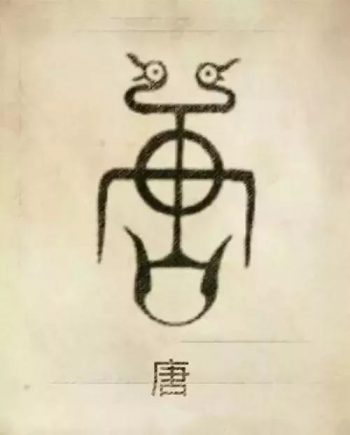The Tang(táng) surname is one of the oldest and most storied surnames in China, with origins deeply rooted in ancient legends, feudal systems, and the blending of multiple ethnic cultures. For those interested in Chinese history and genealogy, the Tang surname offers a fascinating window into the evolution of Chinese civilization.

Ⅰ、Origins of the Tang Surname
The Tang(táng) surname has multiple origins, reflecting the rich tapestry of Chinese history and the integration of diverse cultures. Here are the main sources:
1. The Ancient Roots:
The Tang surname traces its earliest origins to Emperor Yao, one of the legendary Five Emperors of ancient China. His son, Danzhu, was granted the title of Marquis of Tang (in modern-day Hebei Province). After the Zhou Dynasty suppressed a rebellion by Danzhu's descendants, some of the clan members migrated to Du (modern-day Xi'an, Shaanxi Province) and continued to use the Tang surname.
2. The Ji Clan Branch:
During the Western Zhou Dynasty, King Cheng of Zhou destroyed the ancient Tang state in Shanxi and granted the territory to his younger brother, Shu Yu, who became known as Marquis Tang of Shu. His descendants adopted "Tang" as their surname. Additionally, the Tang state in Hubei, which was ruled by the Ji clan, was conquered by King Zhao of Chu during the Spring and Autumn period, and its people also adopted the Tang surname.
3. Ethnic Integration:
The Tang surname also reflects the assimilation of various ethnic groups into Chinese culture:
During the Eastern Han Dynasty, the leader of the Bailang tribe (ancestors of the Pumi people) bore the Tang surname.
In the Yuan Dynasty, the Uyghur Tangrenzu family adopted the Tang surname.
During the Qing Dynasty, Manchu clans such as Tatara and Tanggu also adopted the Tang surname.
Ⅱ、Historical Figures of the Tang Surname
The Tang surname has been associated with numerous influential figures throughout Chinese history, spanning politics, culture, and science:
1. Founders of Ancient Civilization
Tang Yao: Revered as one of the Five Emperors, he established the tradition of abdicating the throne to the most virtuous, setting a moral example for governance.
Tang Shu Yu: The founder of the Jin state, his descendants formed one of the most prominent branches of the Tang surname.
Tang Ju: A renowned diplomat of the Warring States period, famous for his unwavering resolve in diplomatic missions.
2. Luminaries of Culture and Art
Tang Yin (Tang Bohu): One of the "Four Great Masters of the Ming Dynasty," celebrated for his poetry and painting, with works like Returning Home on a Donkey becoming cultural treasures.
Tang Wan: A talented poet of the Southern Song Dynasty, known for her tragic love story with the poet Lu You, immortalized in the poem The Phoenix Hairpin.
3. Modern Pioneers
Tang Lan: A leading scholar in oracle bone script research, he deciphered the inscriptions on the Sword of Goujian and laid the foundation for modern Chinese paleography.
Tang Aoqing: Known as the "Father of Quantum Chemistry in China," he advanced the field of theoretical chemistry.
Tang Yu: A prominent Indonesian shipping magnate who played a key role in strengthening the economic networks of overseas Chinese in Southeast Asia.
Ⅲ、Cultural Significance
The Tang surname carries profound cultural meaning, reflected in its ancestral halls, family teachings, and migration history:
1. Ancestral Halls and Regional Influence
The Hall of Abdication: Commemorating the virtue of Emperor Yao's "abdicating the world", advocating modesty and benevolent governance.
Yifeng Hall: Commemorates the achievements of Fei Xun, a Han Dynasty official known for promoting moral reform.
2.Family Teachings and Values
The Tang Family Instructions from the Qing Dynasty emphasize principles such as "respecting filial piety, strengthening clan ties, and valuing frugality." For example, the teaching "Brothers should care for each other and not let disputes over property destroy family bonds" remains influential among Tang families today.
3.Migration Patterns
The Tang surname originated in Shanxi and Hebei, spreading to Jiangsu and Sichuan during the Qin and Han Dynasties. During the Wei, Jin, and Southern Dynasties, many Tang families migrated south to Zhejiang and Jiangsu due to warfare. By the Song and Yuan Dynasties, they had moved further south to Fujian and Guangdong, and during the Ming and Qing Dynasties, they reached Taiwan and Southeast Asia.
Ⅳ、Social Impact
1.Population and Distribution
Today, the Tang surname is one of the most common in China, with approximately 16 million people bearing the name. It is most concentrated in Hunan (18%), Sichuan, and Guangdong, with a notable "south-heavy, north-light" distribution pattern.
2.Historical Contributions
Politics: Tang Renzu's family in the Yuan Dynasty promoted ethnic integration.
Science: Tang Du, an astronomer of the Western Han Dynasty, contributed to the creation of the Taichu Calendar, a cornerstone of ancient Chinese astronomy.
Economy: Modern Tang entrepreneurs, such as Tang Jiezhong of the New Hope Group, have played a significant role in China's private sector growth.
Conclusion
The Tang surname is like a living history book of Chinese civilization, embodying the wisdom of ancient governance and the spirit of multicultural integration. From Emperor Yao's legacy of abdication to Tang Lan's contributions to paleography, from Tang Bohu's artistic brilliance to the global presence of modern Tang communities, this surname has consistently played a dynamic role in shaping history. Its family teachings of "filial piety and loyalty" and its migration history of "exploration and resilience" together form the dual genetic code of Tang culture, continuing to influence family traditions and societal values today.